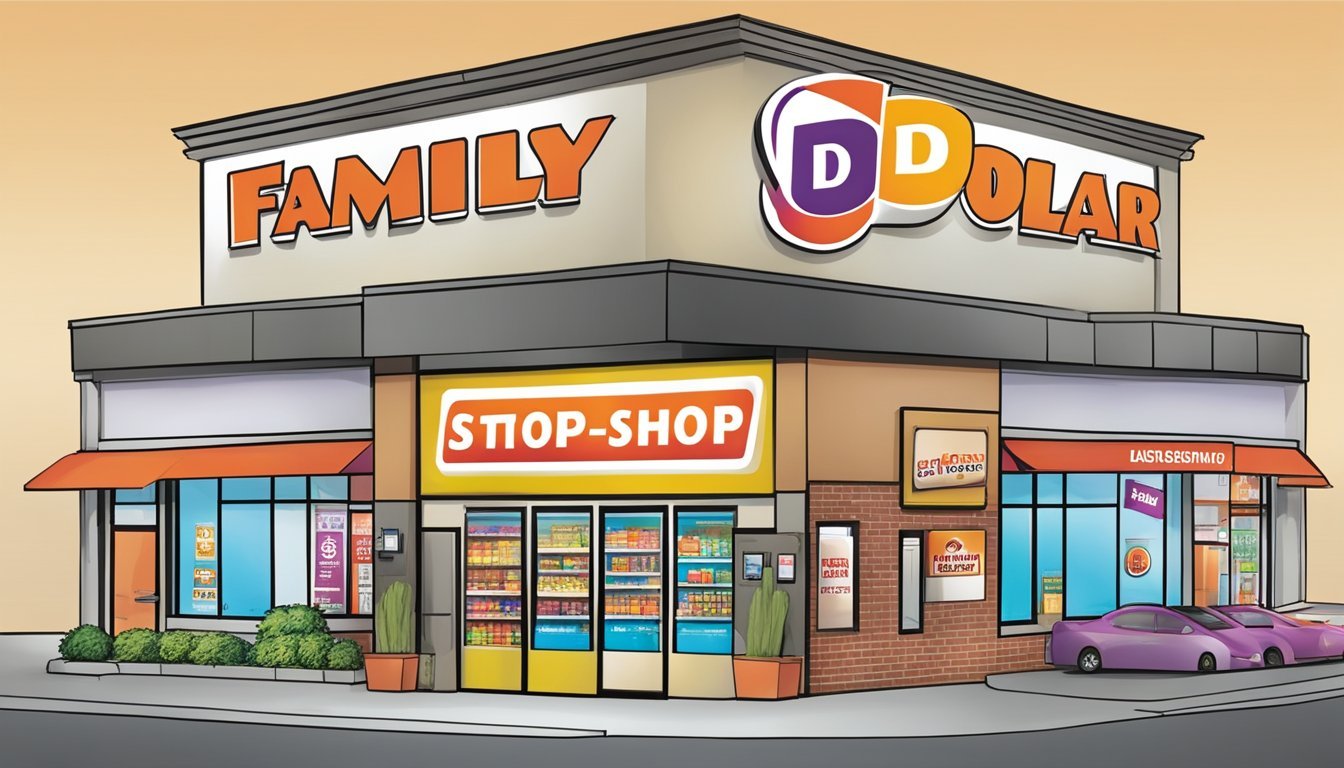Family Dollar vs Stop & Shop
A Comprehensive Price and Quality Comparison
When it comes to grocery shopping, consumers are always on the lookout for the best deals and quality products. Family Dollar and Stop & Shop are two well-known retailers that offer grocery items, but they cater to different market segments. Family Dollar focuses on providing everyday essentials at discounted prices, while Stop & Shop is a full-service supermarket chain offering a wider range of products.
Family Dollar, part of the dollar store category, primarily stocks budget-friendly grocery items and household goods. The chain has expanded its presence across the United States, attracting budget-conscious shoppers. Stop & Shop, on the other hand, operates as a traditional supermarket chain in the Northeast, offering a more extensive selection of groceries, fresh produce, and specialty items.
The choice between Family Dollar and Stop & Shop ultimately depends on individual shopping needs and preferences. Family Dollar may appeal to those seeking quick, affordable purchases, while Stop & Shop caters to customers looking for a comprehensive grocery shopping experience with a broader product range and potentially higher quality options.
Company Profiles
Family Dollar and Stop & Shop represent two distinct segments of the retail grocery market. Their histories, ownership structures, and market presence shape their unique positions in the industry.
History and Ownership
Family Dollar was founded in 1959 by Leon Levine in Charlotte, North Carolina. It began as a single store and grew into a major discount retailer. In 2015, Dollar Tree acquired Family Dollar for $8.5 billion, creating a combined entity with over 13,000 stores across North America.
Stop & Shop traces its roots back to 1914 when it started as a small grocery store in Somerville, Massachusetts. Today, it operates as a subsidiary of Ahold Delhaize, a Dutch-Belgian retail company. Ahold Delhaize acquired Stop & Shop in 1996 as part of its expansion into the U.S. market.
Market Presence
Family Dollar operates over 8,000 stores across 46 states, primarily in rural and urban areas. It focuses on providing everyday low prices on household goods, groceries, and personal care items. The chain targets budget-conscious shoppers and competes with other discount retailers.
Stop & Shop maintains a strong presence in the Northeast United States, with over 400 stores across Massachusetts, Connecticut, Rhode Island, New York, and New Jersey. As a full-service supermarket, it offers a wide range of products including fresh produce, meats, bakery items, and household goods.
Both chains face competition from other retailers in their respective segments. Family Dollar competes with Dollar General and Dollar Tree, while Stop & Shop contends with regional supermarkets and national chains like Walmart and Target.
Product Range and Quality
Family Dollar and Stop & Shop offer distinct product selections and quality levels. Their offerings cater to different customer needs and preferences.
Freshness and Quality of Produce
Stop & Shop provides a wider variety of fresh produce compared to Family Dollar. Their fruits and vegetables are generally fresher and of higher quality. Stop & Shop often stocks organic produce options, appealing to health-conscious shoppers.
Family Dollar's produce selection is limited, focusing on basic items like apples, bananas, and potatoes. The quality can be inconsistent, and organic options are rarely available.
Stop & Shop rotates seasonal fruits and vegetables more frequently. They also have dedicated produce staff to maintain freshness and presentation.
Availability of Meat and Deli Items
Stop & Shop excels in this category with full-service meat and deli counters. They offer a range of fresh cuts, poultry, and seafood. Their deli provides sliced meats, cheeses, and prepared salads.
Family Dollar typically does not have fresh meat or deli departments. They stock some pre-packaged meats and cheeses in their refrigerated sections.
Stop & Shop often features specialty meats and local favorites. Their butchers can provide custom cuts upon request.
Assortment of Dry Goods and Pantry Staples
Both stores carry a variety of dry goods and pantry staples, but with different focuses. Stop & Shop offers a broader range of name-brand and generic products. They stock specialty items, international foods, and dietary-specific options like gluten-free products.
Family Dollar emphasizes value-priced items and smaller package sizes. They carry many generic and lesser-known brands. Their selection is more limited but covers essential pantry needs.
Stop & Shop typically has multiple options for each product category. Family Dollar usually stocks one or two choices per item type, prioritizing affordability over variety.
Pricing and Savings
Family Dollar and Stop & Shop employ different pricing strategies and savings opportunities for customers. Both stores aim to provide value, but their approaches vary in terms of everyday pricing, promotional offers, and loyalty programs.
Everyday Low Prices and Discounts
Family Dollar focuses on consistently low prices across its product range. The store offers many items priced at $1 or less, making it attractive for budget-conscious shoppers. Generic staples and household essentials are often cheaper at Family Dollar compared to traditional supermarkets.
Stop & Shop, while generally higher-priced, provides a wider selection of products. The store runs frequent sales and markdowns on popular items. Stop & Shop also uses loss leaders - deeply discounted products to attract customers - more extensively than Family Dollar.
Both stores offer digital coupons through their respective apps or websites. These coupons can lead to significant savings on select items.
Comparison of Deals and Weekly Sales
Family Dollar's weekly ads typically feature a mix of $1 deals and discounts on brand-name products. The store often runs promotions like "Buy One, Get One 50% Off" on specific categories.
Stop & Shop's weekly circular includes a broader range of deals across various departments. The store frequently offers multi-buy promotions (e.g., "10 for $10") and percentage-off discounts on fresh produce and meat.
Stop & Shop's sales tend to rotate more frequently, while Family Dollar maintains consistent pricing with occasional promotional periods. Both stores adjust their deals based on seasonal demands and product availability.
Loyalty Programs and Savings Opportunities
Family Dollar's Smart Coupons program allows customers to load digital coupons to their account for use at checkout. The program is straightforward but offers limited personalized deals.
Stop & Shop's GO Rewards program is more comprehensive. Members earn points on purchases, which can be redeemed for gas savings or groceries. The program also provides personalized deals based on shopping history.
Stop & Shop's loyalty program includes additional perks like exclusive member-only prices and surprise savings loaded to customers' accounts. Family Dollar, in contrast, relies more on its everyday low price strategy than a robust loyalty program.
Store Locations and Accessibility
Family Dollar and Stop & Shop have different approaches to store locations and accessibility. Their regional presence, store proximity, and in-store experiences vary significantly.
Regional Availability
Family Dollar operates over 8,000 stores across 46 states, with a strong presence in rural and urban areas. The chain focuses on serving lower-income communities and small towns.
Stop & Shop concentrates its operations in the Northeast. With more than 400 locations, the supermarket chain has a significant footprint in New England, New York, and New Jersey. It also serves parts of Connecticut, Massachusetts, and Rhode Island.
Family Dollar's wider geographic spread contrasts with Stop & Shop's regional focus.
Store Proximity and Convenience
Family Dollar stores are often found in neighborhoods, strip malls, and small shopping centers. This placement strategy aims to provide easy access for customers without requiring long travel times.
Stop & Shop typically operates larger stores in suburban areas and shopping plazas. While fewer in number, these locations often serve as anchor stores in their communities.
Urban areas may have multiple Family Dollar stores within close proximity, while Stop & Shop locations are generally more spread out.
Parking and In-Store Navigation
Family Dollar stores usually have small parking lots suitable for quick trips. The compact store layout allows for easy navigation, with most products visible from the main aisles.
Stop & Shop offers more extensive parking facilities to accommodate longer shopping visits. Their larger floor plans include wide aisles and clear signage to help customers locate departments.
Family Dollar's layout prioritizes efficiency for grab-and-go shopping. Stop & Shop provides a more comprehensive grocery experience with dedicated sections for produce, meats, and bakery items.
Customer Experience
Family Dollar and Stop & Shop offer distinct shopping experiences for customers. Their approaches to service, store layout, and checkout processes shape how shoppers interact with each retailer.
In-Store Service and Atmosphere
Family Dollar provides a no-frills shopping environment focused on affordability. Stores are typically smaller with narrow aisles and basic shelving. Staff assistance may be limited, as the emphasis is on self-service.
Stop & Shop aims for a more polished atmosphere. Wider aisles, brighter lighting, and organized displays create a welcoming ambiance. Employees are generally more visible and available to help customers locate items or answer questions.
Both stores stock a mix of name brands and private labels. Family Dollar carries more discount brands, while Stop & Shop offers a broader selection of premium products.
Ease of Finding Items
Family Dollar's compact layout can make finding specific products challenging. Items are often grouped by category but may not follow a logical flow throughout the store. Regular shoppers tend to develop familiarity with product locations over time.
Stop & Shop employs a more intuitive store layout. Clear signage and organized departments help customers navigate efficiently. Digital store maps and mobile apps assist in locating items quickly.
Both retailers aim to stock essentials for convenient shopping trips. Family Dollar focuses on household basics, while Stop & Shop provides a full grocery selection.
Check-Out Efficiency
Family Dollar typically has fewer checkout lanes, which can lead to longer wait times during peak hours. Self-checkout options are limited or unavailable in most locations.
Stop & Shop offers more registers and often includes self-checkout kiosks. This variety helps manage customer flow and reduce lines. Mobile scan-and-go technology in some stores further streamlines the checkout process.
Payment options are similar at both retailers, accepting cash, cards, and mobile payments. Stop & Shop's loyalty program integrates with checkout for instant savings, while Family Dollar's rewards are generally applied to future purchases.
Value-Added Services
Family Dollar and Stop & Shop offer various services to enhance the shopping experience. These range from convenient delivery options to in-store amenities that cater to diverse customer needs.
Delivery and Pick-Up Options
Stop & Shop provides grocery delivery through Peapod. Customers can order online or via mobile app for same-day delivery in many areas. The store also offers curbside pickup at select locations.
Family Dollar, while primarily focused on in-store shopping, has partnered with Instacart in some regions to provide delivery services. This option is less extensive than Stop & Shop's offerings.
Both chains have loyalty programs. Stop & Shop's rewards program allows customers to earn points on purchases, redeemable for discounts on gas or groceries. Family Dollar's Smart Coupons program provides digital coupons and personalized offers.
In-Store Additional Services
Stop & Shop features in-store bakeries, offering fresh bread, cakes, and pastries. Many locations include prepared food sections with rotisserie chickens, salad bars, and hot meal options.
The chain also provides pharmacy services at numerous stores, along with coin-counting machines and Western Union money transfer services.
Family Dollar focuses on essential groceries and household items. While lacking extensive fresh food departments, some stores offer a limited selection of produce and frozen foods.
Neither chain typically hosts farmers markets, but Stop & Shop emphasizes organic and fresh food options more prominently than Family Dollar.
Brand and Corporate Responsibility
Family Dollar and Stop & Shop take different approaches to corporate responsibility, focusing on distinct areas to build their brand image and contribute to society.
Community Involvement and Sustainability Efforts
Stop & Shop demonstrates a strong commitment to community involvement. The supermarket chain partners with local food banks to address food insecurity. They donate unsold, edible food to help those in need.
Stop & Shop also prioritizes sustainability. The company has implemented energy-efficient technologies in its stores to reduce its carbon footprint. They've installed solar panels on some locations and use LED lighting to conserve energy.
Family Dollar's community efforts focus on education. The chain supports literacy programs and provides school supplies to underserved communities. They also partner with national organizations to support children's health initiatives.
Product Sourcing and Ethical Practices
Stop & Shop emphasizes quality and healthy options in its product sourcing. The chain offers a wide selection of organic and locally-sourced produce. They work directly with farmers to ensure fresh, high-quality products for consumers.
The company has also committed to sustainable seafood practices. Stop & Shop only sells seafood from certified sustainable sources, promoting responsible fishing methods.
Family Dollar focuses on value in its product sourcing. They work with manufacturers to offer private-label products at competitive prices. While their emphasis is on affordability, the chain has made efforts to improve product quality in recent years.
Both retailers have implemented supplier codes of conduct to ensure ethical practices throughout their supply chains. These codes address issues such as fair labor practices and environmental standards.
Competitive Comparison
Family Dollar and Stop & Shop occupy different niches in the grocery retail landscape. Their market positions and unique offerings shape how they compete against each other and other major players in the industry.
Market Position Among Competitors
Family Dollar operates in the discount retail segment, competing directly with Dollar General and Dollar Tree. It offers a mix of groceries and household items at low prices. Stop & Shop, on the other hand, is a full-service supermarket chain primarily found in the Northeast.
Stop & Shop faces competition from other regional grocers like ShopRite, Giant, and Hannaford. It also competes with national chains such as Walmart, Target, and Whole Foods. In terms of pricing, Stop & Shop tends to be higher than discount stores and some competitors like Walmart and Aldi.
Family Dollar's focus on value puts it in a strong position against other discount retailers. However, it lacks the extensive grocery selection of full-service supermarkets.
Unique Selling Propositions
Family Dollar's main selling point is its low prices on a variety of everyday items. It caters to budget-conscious shoppers looking for quick, convenient purchases. The store's smaller format allows it to operate in areas that may not support larger supermarkets.
Stop & Shop differentiates itself through:
Wider product selection, including fresh produce and specialty items
In-store pharmacies and banking services
Loyalty program with gas savings
Focus on local and regional products
While Family Dollar emphasizes affordability, Stop & Shop aims to provide a more comprehensive shopping experience. This includes higher quality produce and meat departments, which are often limited or absent in discount stores.
Both chains face growing competition from online retailers and grocery delivery services. Stop & Shop has responded by offering its own delivery options, while Family Dollar relies more on its physical store presence.










